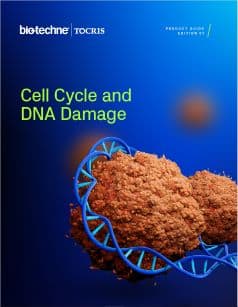DNA-Dependent Protein Kinase
DNA-dependent protein kinase (DNA-PK) is a nuclear protein serine/threonine kinase that is a molecular sensor of DNA damage. DNA-PK is involved in the ligation step of the non-homologous end joining (NHEJ) pathway of DNA double strand break (DSB) repair.
DNA-Dependent Protein Kinase Inhibitors |
|
|---|---|
| Cat. No. | Product Name / Activity |
| 7825 | AZD 7648 |
| Potent and selective DNA-PK inhibitor; enhances CRISPR-mediated HDR efficiency | |
| 4840 | KU 0060648 |
| Dual DNA-PK and PI 3-K inhibitor | |
| 5834 | LTURM 34 New |
| Potent DNA-PK inhibitor; also increases CRISPR-Cas9 deletion efficiency | |
| 2828 | NU 7026 |
| Selective DNA-PK inhibitor | |
| 3712 | NU 7441 |
| Potent and selective DNA-PK inhibitor | |
| 6792 | Omipalisib |
| Potent DNA-PK inhibitor; also inhibitor of mTOR and highly potent inhibitor of PI 3-kinase | |
| 2930 | PI 103 hydrochloride |
| Inhibitor of DNA-PK, mTOR and PI 3-kinase | |
DNA-dependent protein kinase (DNA-PK) is a nuclear protein serine/threonine kinase that is a molecular sensor of DNA damage. DNA-PK is involved in the ligation step of the non-homologous end joining (NHEJ) pathway of DNA double strand break (DSB) repair, V(D)J recombination and telomere stabilization.
DNA-PK is activated by phosphorylation by ATM/ATR following DNA damage and is inhibited by wortmannin. DNA-PK must be bound to DNA in order to exhibit its catalytic properties and has multiple targets including c-Abl, histone H1, c-jun, p53, c-Myc and more.
External sources of pharmacological information for DNA-Dependent Protein Kinase :
Literature for DNA-Dependent Protein Kinase
Tocris offers the following scientific literature for DNA-Dependent Protein Kinase to showcase our products. We invite you to request* your copy today!
*Please note that Tocris will only send literature to established scientific business / institute addresses.
Cell Cycle and DNA Damage Research Product Guide
This product guide provides a review of the cell cycle and DNA damage research area and lists over 150 products, including research tools for:
- Cell Cycle and Mitosis
- DNA Damage Repair
- Targeted Protein Degradation
- Ubiquitin Proteasome Pathway
- Chemotherapy Targets
Cell Cycle & DNA Damage Repair Poster
In normal cells, each stage of the cell cycle is tightly regulated, however in cancer cells many genes and proteins that are involved in the regulation of the cell cycle are mutated or over expressed. This poster summarizes the stages of the cell cycle and DNA repair. It also highlights strategies for enhancing replicative stress in cancer cells to force mitotic catastrophe and cell death.

